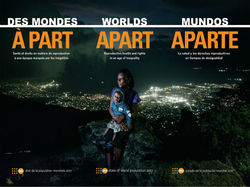
Our world is increasingly unequal, with sharp differences in terms of wealth, power, rights and opportunities. That is the focus of this year’s UNFPA report The State of World Population 2017 – WORLDS APART: reproductive health and rights in an age of inequality. On 25 October, Nadine Krysostan from the UNFPA Brussels Office, presented the report in the Belgian parliament.
While economic inequality is improving between countries, it is worsening within many countries. In at least 34 countries, gaps between the richest and poorest grew between 2008 and 2013. In those countries, a privileged few are rising to the top, whilst the ranks of those at the bottom are growing.
Costs of inequality
This growing inequality comes at a cost. Extreme inequality has been shown to reduce economic growth. It does not allow a country to make use of people’s capacities, leads to a concentration of economic and political power, and can ultimately result in economic and political instability. The report looks at two critical, intertwined dimensions of inequalities: those in achieving sexual and reproductive health and rights and gender inequality.
Poorest women cannot decide for themselves
Women at the bottom of the economic ladder generally have little access to services and are in the weakest position to exercise their reproductive rights. The poorest women often cannot decide for themselves whether, when or how often to become pregnant. They have the least access to quality care during pregnancy and childbirth. This inequality has lasting repercussions for women’s health, career and earnings, as well as for the wellbeing of their families and the development of their communities.
Motherhood penalty
For women everywhere, pregnancy and child-bearing can mean exclusion from the labour force or lower earnings. In a way there is a “Motherhood penalty”. Women typically lose ground in earnings for taking time off during pregnancy, or after giving birth. Lack of maternity leave can also force women to have to choose between participating in the labour force and giving birth, or between their productive and reproductive lives. Globally, about 60 per cent of working women do not benefit from any statutory right to maternity leave.
Upholding universal rights
Inequality can be tackled, but the question is where to begin. The SWOP makes the case for governments to start with those who are lagging the most first. Without a renewed focus on the poorest in all populations, achieving the Sustainable Development Goals by 2030 may be out of reach. The Belgian parliamentarians held a discussion on how governments should uphold universal rights. They discussed how Belgium could promote to anchor gender equality into national laws. A top action is making reproductive health care universally accessible, in line with the objectives of the Programme of Action of the International Conference in Population and Development. During the discussions it was emphasised that this will not only help fulfil a poor woman’s reproductive rights but will also help her overcome inequalities in education and income, with benefits that accrue to her, her family and her country.
Costs of inequality
This growing inequality comes at a cost. Extreme inequality has been shown to reduce economic growth. It does not allow a country to make use of people’s capacities, leads to a concentration of economic and political power, and can ultimately result in economic and political instability. The report looks at two critical, intertwined dimensions of inequalities: those in achieving sexual and reproductive health and rights and gender inequality.
Poorest women cannot decide for themselves
Women at the bottom of the economic ladder generally have little access to services and are in the weakest position to exercise their reproductive rights. The poorest women often cannot decide for themselves whether, when or how often to become pregnant. They have the least access to quality care during pregnancy and childbirth. This inequality has lasting repercussions for women’s health, career and earnings, as well as for the wellbeing of their families and the development of their communities.
Motherhood penalty
For women everywhere, pregnancy and child-bearing can mean exclusion from the labour force or lower earnings. In a way there is a “Motherhood penalty”. Women typically lose ground in earnings for taking time off during pregnancy, or after giving birth. Lack of maternity leave can also force women to have to choose between participating in the labour force and giving birth, or between their productive and reproductive lives. Globally, about 60 per cent of working women do not benefit from any statutory right to maternity leave.
Upholding universal rights
Inequality can be tackled, but the question is where to begin. The SWOP makes the case for governments to start with those who are lagging the most first. Without a renewed focus on the poorest in all populations, achieving the Sustainable Development Goals by 2030 may be out of reach. The Belgian parliamentarians held a discussion on how governments should uphold universal rights. They discussed how Belgium could promote to anchor gender equality into national laws. A top action is making reproductive health care universally accessible, in line with the objectives of the Programme of Action of the International Conference in Population and Development. During the discussions it was emphasised that this will not only help fulfil a poor woman’s reproductive rights but will also help her overcome inequalities in education and income, with benefits that accrue to her, her family and her country.

 RSS Feed
RSS Feed